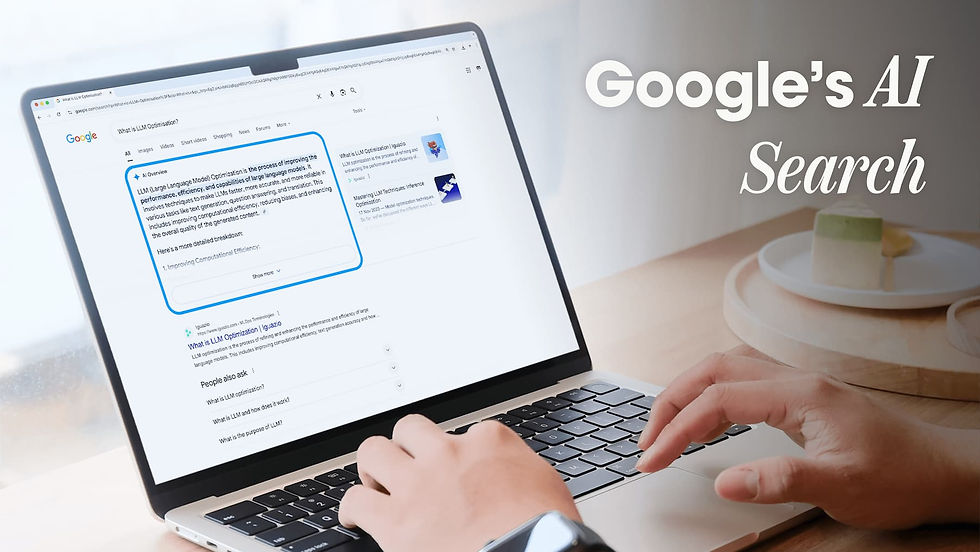What the Hell Is LLM Optimisation and Should You Care?
- Nathan Webster

- Jul 14, 2025
- 3 min read
You’ve probably seen it pop up in headlines, strategy meetings or LinkedIn posts that sound like they came from a robot. “LLM optimisation is the future of search.” Okay, but what’s an LLM? And why is everyone suddenly speaking in acronyms?

It can feel like you missed a meeting. Like this whole “optimising for AI” thing snuck in while you were just trying to update your homepage.
Let’s slow it down. We’re going to unpack what LLM optimisation actually means, why it matters right now, and what small businesses can do to stay visible in a search world that is quickly being rewritten by AI.
First: What’s an LLM?
LLM stands for Large Language Model. These are AI systems trained on enormous amounts of text, like ChatGPT, Claude, or Google’s Gemini.
Instead of pointing users to websites the way traditional Google did, LLMs generate answers. They digest content from across the web and serve it up directly, often without requiring users to click through to anything.
That is a big shift. If your website or content is not feeding into these models, you risk becoming invisible.
So What Is LLM Optimisation?
LLM optimisation is about shaping your online presence so that AI tools can easily understand, summarise, and include you in their answers.
It is not just a new version of SEO. It is a related but different approach. Traditional SEO was about ranking well in a list of links. LLM optimisation is about becoming the answer itself.
That involves a few key practices:
Writing content that is clear, helpful and rooted in your expertise
Structuring your site so that machines, not just people, can understand it
Sending consistent signals across the web that show credibility
Making it easy for AI to quote you, recommend you, and trust you

Why It Matters Right Now
Two major changes are making this more urgent:
Google’s new AI search experience is already being rolled out. It changes how results appear by placing direct, AI-written summaries above traditional links.
At the same time, people are using tools like ChatGPT to search. Instead of typing into Google, they are asking a chatbot questions like “Who does the best wedding videography in Perth?” The model then responds with a direct answer. If your business is not in its sources, you do not get mentioned.
That means if you are not visible to these tools, you are not just missing SEO traffic. You are missing the entire conversation.
What You Can Actually Do
You do not need to reinvent the wheel, but you do need to be intentional. Here are the key areas to focus on:
Make your website clear and crawlable
Use plain language. Make sure each service has its own page. Avoid hiding important information behind popups or complex design.
Add FAQs and answer real questions
Think like your customer. What would they type into an AI chatbot? Turn those questions into answers on your website.
Blog regularly, with purpose
Do not write for clicks. Write to help. Use blog posts to answer specific, practical questions in your area of expertise. Keep them consistent. Offering free advice builds trust and gives AI something useful to pull from.
Use schema markup
This is a bit more technical, but it helps search engines understand what your content means. Tools like Yoast or RankMath can make this easier if you use WordPress. If you're using Wix Studio, it also offers a professional solution with built-in support for structured data, LLM-optimised frameworks, and fully customisable templates that cater to both SEO and AI-driven discovery.
Be consistent everywhere online
Make sure your business name, location, and services match across your website, online directories, and social platforms. Mixed signals confuse AI models and reduce your visibility.
Avoid fluff
AI responds best to clarity and authority. Skip the jargon. Be specific about what you do, how you do it, and why it matters.

Closing Thoughts
LLM optimisation is not a passing trend. It is the next stage in how people find and trust businesses online. It is not about tricking algorithms. It is about being genuinely useful and presenting your content in a way that both humans and machines can understand. So if you have been avoiding your blog, putting off writing FAQs, or relying on a five-year-old homepage that has not been touched since launch, this is the moment to step up.
If you are not sure where to start or have a few questions, just get in touch. We are happy to help.




